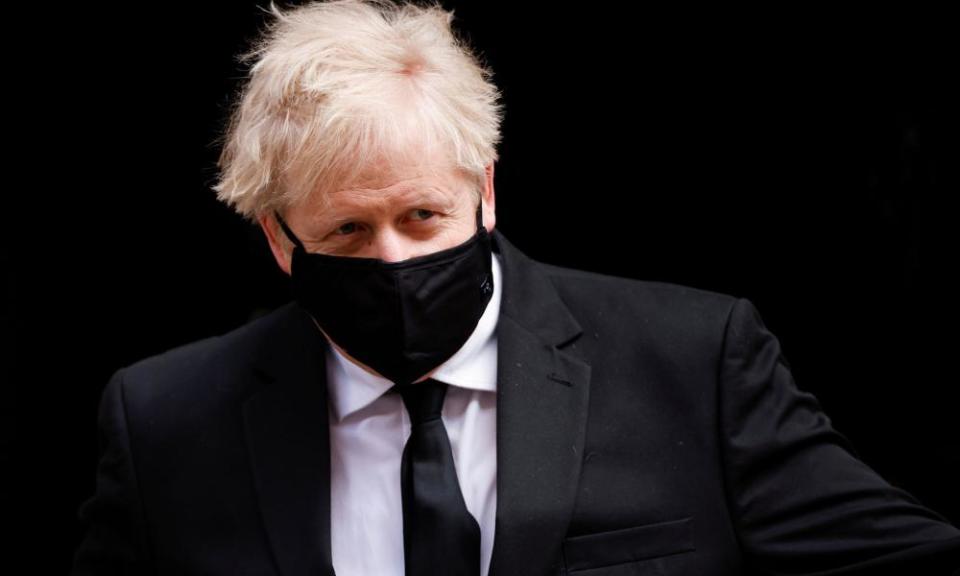Boris Johnson to press on with lifting Covid lockdown despite variant fears

Boris Johnson has told his cabinet that he intends to proceed with the roadmap for lifting England’s lockdown despite concerns over a new coronavirus variant, but said the government would monitor the data over the coming days.
The prime minister told reporters on Tuesday he saw no conclusive evidence to delay the full reopening of the economy on 21 June, though sources have suggested it may not be as comprehensive a lifting of restrictions as previously billed.
“I don’t see anything conclusive at the moment to say that we need to deviate from the roadmap. We’ve got to be cautious and we are keeping everything under very close observation. We’ll know a lot more in a few days’ time,” Johnson said. “We will be letting people know as much as we can, as soon as we can.”
Convening his cabinet on Tuesday, Johnson stressed his desire to continue to work through the planned lifting of lockdown, which would mean all remaining restrictions on businesses and social contact removed from 21 June.
The health secretary, Matt Hancock, told the meeting “comprehensive work” to provide more vaccines and surge testing in outbreak areas was continuing.
Johnson also played down suggestions that vaccine hesitancy was playing a role in the sharp rise in cases in Bolton and Blackburn, as well as recently in Bedford where surge testing has been put in place in two schools. On Tuesday, Nuneaton became the latest area where surge testing is being deployed after an increase in cases linked to the coronavirus variant first identified in India.
“This country is quite extraordinary. There was a poll I think done last night which showed that of all the countries in the world we are the most positive about vaccinations, the numbers are incredibly high,” Johnson said.
“And I know that some people have been more vaccine-hesitant than others, but actually across the whole of society, the numbers continue to go up in every group in every age group, and that’s very, very encouraging.”
Johnson’s spokesman said the government was still unclear on a number of factors that could affect the planned reopening on 21 June.
“At this stage we don’t have information on something like transmissibility, which would be a key factor in informing what decisions we have to make, so while we don’t have that data it’s simply not possible to make those kinds of decisions at this point,” the spokesman said.
Earlier, the environment secretary, George Eustice, said local lockdowns remained a possibility in some parts of England.
“If we do have a deterioration in some of these areas, then of course we can’t rule out that we would put in place certain local lockdowns. At the moment we are doing a lot of intensive surveillance in those areas, with surge testing to identify it and deal with it,” he told Times Radio.
There is heightened concern over the potential spread across the UK of the new variant of coronavirus first detected in India. On Monday, public health experts said the B.1.617.2 variant was expected to become the dominant strain in the UK within days.
Speaking to BBC Breakfast on Tuesday, Vicky Head, the director of public health for Bedford, said she was “really worried” about the local increase in Covid-19 cases linked to the new variant.
The town has the second-highest rate of coronavirus in England, with 214 new cases recorded in the seven days to 13 May. Head said cases in Bedford had jumped from “three or four” a day to up to 10 times that figure over the past month.
“What we think now is that pretty much all of our cases are likely to be the variant from India,” Head said, adding that surge testing was being planned to identify those who have the virus but are not showing symptoms, to ensure they self-isolate.
Easing of restrictions continues across England, with mass events beginning again, including a Premier League football match between Manchester United and Fulham on Tuesday, which is expected to draw 10,000 fans to Old Trafford.
Eustice was challenged on Radio 4’s Today programme over whether the match muddies the waters about government recommendations and guidance on social distancing and other measures to curb the spread of coronavirus. Many Manchester United fans are expected to travel to the match from nearby Bolton, which had the highest case rate in the country as of 11 May, with 255 cases per 100,000 residents.
The minister insisted the government was “keeping a close eye” on the situation in the town. “What we’re doing in places like Bolton … is that we are doing surge testing in those areas so that we can monitor the situation closely and see what’s happening and obviously we can’t rule out measures that we might take in the future,” Eustice said.

 Yahoo News
Yahoo News 